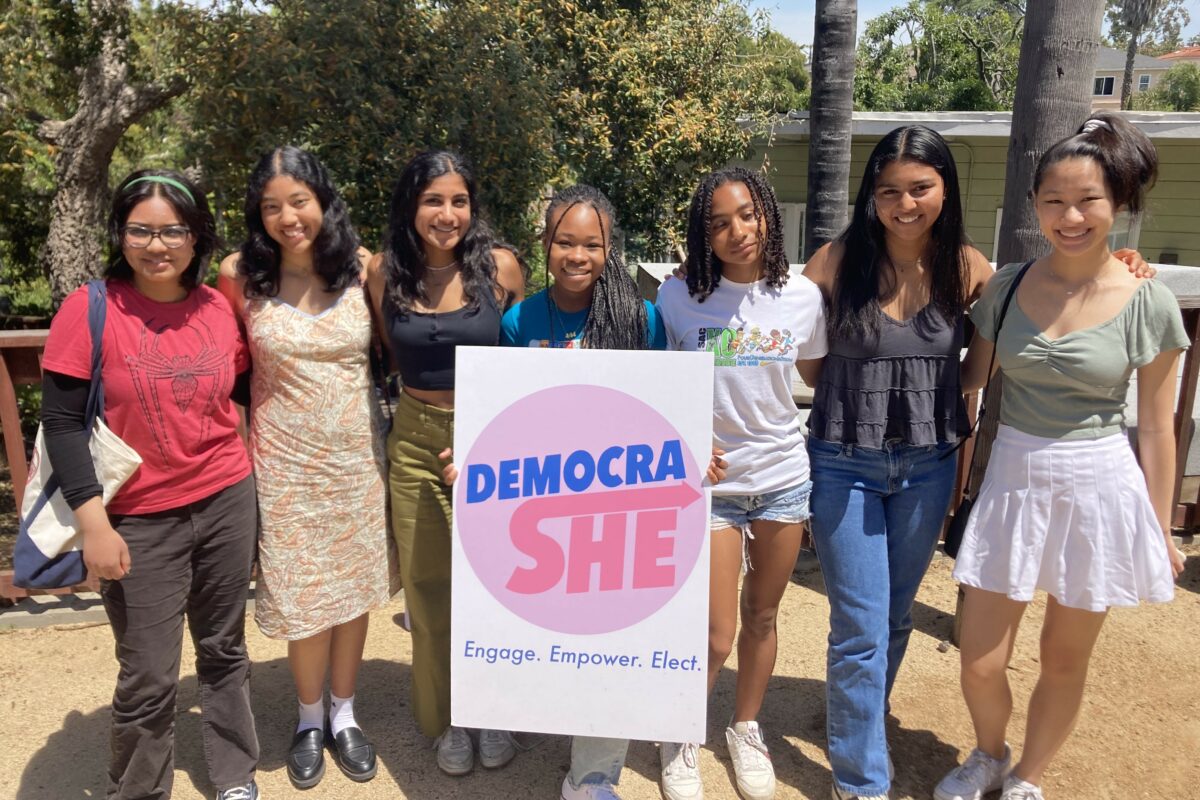
Despite progress, women remain vastly underrepresented in American politics. Today, women make up only 28% of Congress, yet they comprise 51% of the U.S. population. That number drops further when considering women of color (5.4% of Congress) and LGBTQ women, with only seven individuals across all 535 Congressional seats.
This lack of representation sends a damaging message to girls, especially those from marginalized communities: you don’t belong here. Founded by Sarah Jakle, a former Get Out the Vote Director for the California National Organization for Women, DemocraShe is on a mission to accelerate the pipeline of young female-identifying high school students who wish to hold leadership positions where they can serve their communities.
DemocraShe steps in at a critical moment when girls’ brains are still developing, and key elements like identity, confidence, and worldview are actively taking shape. At this age, many girls aspire to leadership, but they often begin to internalize messages that tell them they shouldn’t.
According to The Girls’ Index, nearly 60% of girls report that they like to be in charge; however, many also fear stepping into leadership roles because they worry that others will perceive them as ‘bossy.’ Since 2017, there has been a 21% increase in the number of girls who report avoiding sharing their opinions or disagreeing with others in order to be liked, rising from 46% to 67%.
Common internal obstacles that stand in the way of women and girls include impostor syndrome, a lack of self-trust, and self-silencing, which involves holding back opinions or ideas due to fear of judgment, conflict, or being perceived as “too much.” Perfectionism, the feeling of pressure to perform flawlessly. In addition to internal barriers, there are external challenges, such as harassment and pushback. During the 2020 election, a study found that female Democratic candidates received 10 times more online abuse than their male counterparts. Republican women faced twice as much.
DemocraShe addresses this head-on by incorporating evidence-based techniques into their civic engagement curriculum, such as grounding, self-compassion, and internalizing an “Inner Best Friend” that shifts imposter syndrome into positive self-talk. By incorporating neuroscience research—the scientific study of the nervous system’s functions and disorders—DemocraShe supports women in overcoming hesitation and self-doubt. This approach empowers them to become informed, engaged advocates and build the skills needed to navigate barriers on their civic and elected journey. DemocraShe empowers girls to understand their brains, stay present, and move forward with clarity and confidence.
DemocraShe’s Pathway to Leadership
DemocraShe’s Flagship program is peer-led: girls teaching girls. With the motto, “You can’t do it wrong,” they focus on growth, resilience, and a sense of belonging. Students move through the program and then return to lead it, creating a cycle of learning, community, and leadership.
The impact of DemocraShe is powerful and measurable. After completing the program, girls report dramatic increases in confidence, emotional resilience, and leadership readiness, with 100% saying they can now navigate identity-based obstacles and 95% feeling comfortable in workplaces where few people look like them. Graduates put their skills into action by starting clubs, interning in political offices, and launching initiatives in their communities. Each Flagship student leaves with a personalized “LaunchPad” plan, and the number who see themselves running for office jumps from 30% (before DemocraShe training) to 84% after.
In 2024, three alumnae did just that—two of them won, including Hafsa Hamdaoui, who was the youngest elected official in Maryland. Hafsa was elected to represent the students of Anne Arundel County Public Schools on the Board of Education in April 2024 and began her one-year term as the 51st Student Member of the Board (SMOB) on July 1, 2024. “A DemocraShe resilience skill that helped me run for office is Inner Best Friend. It’s the voice inside that encourages rather than criticizes. That mindset helped me be elected as the student member of the Maryland Board of Education, and it’s a skill I keep learning on every single day.” (Hafsa comments on DemocraShe’s website.)
Mary’s Pence Grant
Unlike many early political pipeline programs that rely on unpaid internships — often accessible only to those who can afford to work without pay — DemocraShe removes that barrier by paying each student $15 an hour, making it accessible to a broader range of girls.
High school girls are hungry to learn how to make their voices heard, and DemocraShe currently receives seven times as many applications as they can serve. Because their students return to lead the next workshops, the pipeline of facilitators is self-sustaining and scaling is held back only by funding. The Mary’s Pence grant immediately helped fund stipends for participants, allowing the organization to serve more girls, and, even more importantly, gave a young nonprofit key early support.
“Funding from organizations like Mary’s Pence is transformational. In the early stages of a nonprofit, few funders are willing to take a chance on a young nonprofit. By believing in DemocraShe, Mary’s Pence sent a signal that this work matters. This early vote of confidence opens doors, validates the mission, and helps the girls in the program feel the strength of a broader community standing behind them,” Sarah explained.
Sarah dreams of growing capacity to meet demand—and expanding to create College DemocraShe, Middle School DemocraShe, and a stronger national network. She is incredibly grateful for the Mary’s Pence network, which believes in the power of young women and that running for office is their birthright!
